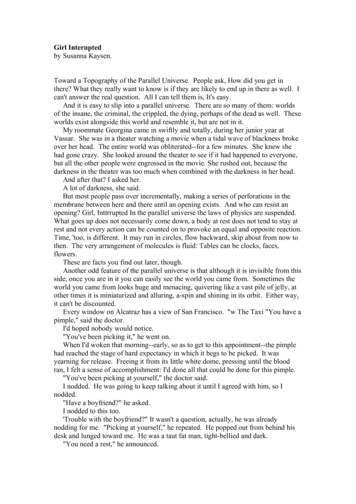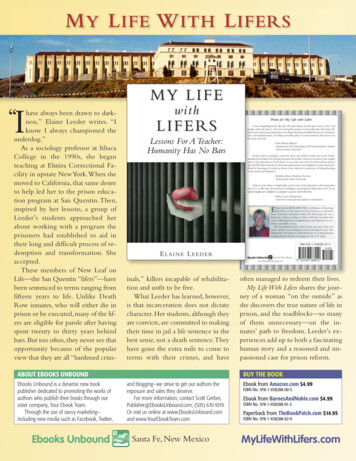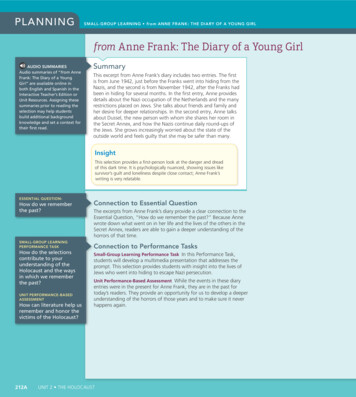
Transcription
Girl Interuptedby Susanna Kaysen.Toward a Topography of the Parallel Universe. People ask, How did you get inthere? What they really want to know is if they are likely to end up in there as well. Ican't answer the real question. All I can tell them is, It's easy.And it is easy to slip into a parallel universe. There are so many of them: worldsof the insane, the criminal, the crippled, the dying, perhaps of the dead as well. Theseworlds exist alongside this world and resemble it, but are not in it.My roommate Georgina came in swiftly and totally, during her junior year atVassar. She was in a theater watching a movie when a tidal wave of blackness brokeover her head. The entire world was obliterated--for a few minutes. She knew shehad gone crazy. She looked around the theater to see if it had happened to everyone,but all the other people were engrossed in the movie. She rushed out, because thedarkness in the theater was too much when combined with the darkness in her head.And after that? I asked her.A lot of darkness, she said.But most people pass over incrementally, making a series of perforations in themembrane between here and there until an opening exists. And who can resist anopening? Girl, Inttrrupted In the parallel universe the laws of physics are suspended.What goes up does not necessarily come down, a body at rest does not tend to stay atrest and not every action can be counted on to provoke an equal and opposite reaction.Time, 'too, is different. It may run in circles, flow backward, skip about from now tothen. The very arrangement of molecules is fluid: Tables can be clocks, faces,flowers.These are facts you find out later, though.Another odd feature of the parallel universe is that although it is invisible from thisside, once you are in it you can easily see the world you came from. Sometimes theworld you came from looks huge and menacing, quivering like a vast pile of jelly, atother times it is miniaturized and alluring, a-spin and shining in its orbit. Either way,it can't be discounted.Every window on Alcatraz has a view of San Francisco. "w The Taxi "You have apimple," said the doctor.I'd hoped nobody would notice."You've been picking it," he went on.When I'd woken that morning--early, so as to get to this appointment--the pimplehad reached the stage of hard expectancy in which it begs to be picked. It wasyearning for release. Freeing it from its little white dome, pressing until the bloodran, I felt a sense of accomplishment: I'd done all that could be done for this pimple."You've been picking at yourself," the doctor said.I nodded. He was going to keep talking about it until I agreed with him, so Inodded."Have a boyfriend?" he asked.I nodded to this too.'Trouble with the boyfriend?" It wasn't a question, actually, he was alreadynodding for me. "Picking at yourself," he repeated. He popped out from behind hisdesk and lunged toward me. He was a taut fat man, tight-bellied and dark."You need a rest," he announced.
I did need a rest, particularly since I'd gotten up so early that morning in order tosee this doctor, who lived out in the suburbs. I'd changed trains twice. And I wouldhave to retrace my steps to get to my job. Just thinking of it made me tired."Don't you think?" He was still standing in front of me. "Don't you think you needa rest?" "Yes," I said.He strode off to the adjacent room, where I could hear him talking on the phone.I have thought often of the next ten minutes--my last ten minutes. I had theimpulse, once, to get up and leave through the door I'd entered, to walk the severalblocks to the trolley stop and wait for the train that would take me back to mytroublesome boyfriend, my job at the kitchen store. But I was too tired.He strutted back into the room, busy, pleased with himself."I've got a bed for you," he said. "It'll be a rest. Just for a couple of weeks, okay?"He sounded conciliatory, or pleading, and I was afraid."I'll go Friday," I said. It was Tuesday,-maybe by Friday I wouldn't want to go.He bore down on me with his belly. "No. You go now." I thought this wasunreasonable. "I have a lunch date," I said."Forget it," he said. "You aren't going to lunch. You're going to the hospital." Helooked triumphant. It was very quiet out in the suburbs before eight in the morning.And neither of us had anything more to say. I heard the taxi pulling up in the doctor'sdriveway.He took me by the elbow--pinched me between his large stout fingers--and steeredme outside. Keeping hold of my arm, he opened the back door of the taxi and pushedme in. His big head was in the backseat with me for a moment. Then he slammed thedoor shut.The driver rolled his window down halfway."Where to?"Coatless in the chilly morning, planted on his sturdy legs in his driveway, thedoctor lifted one arm to point at me."Take her to McLean," he said, "and don't let her out till you get there."I let my head fall back against the seat and shut my eyes. I was glad to be riding ina taxi instead of having to wait for the train.McLean Hospital INTER OFFICE MEMORANDUM TORecord Boom Date Jan 8. 1967FROM Dr. SUBJECT Susanna KaysenSusanna Kaysen was seen by me on April 27, 196?; following my evaluationwhich extended over three hours, I referred her to McLean Hospital for admission.My decision was based on:1. The chaotic unplanned life of the patient at present with progressivedecompensation and reversal of sleep cycle.2.Severe depression and hopelessness and suicidal ideas.3. History of suicidal attempts.4. No therapy and no plan at present, emersion in fantasy, progressive withdrawaland isolation. The patient had been seen in psychotherapy by Dr. (sensored). At notime did I have her in therapy, and the patient knew that I was not a potentialtherapist. lskEtiologyThis person is (pick one):1. on a perilous journey from which we can learn much when he or she returns,
2. possessed by (pick one):.a) the gods,b) God (that is, a prophet),c) some bad spirits, demons, or devils,d) the Devil,3. a witch,4. bewitched (variant of 2);5. bad, and must be isolated and punished,6. ill, and must be isolated and treated by (pick one):a) purging and leeches,b) removing the uterus if the person has one,c) electric shock to the brain,d) cold sheets wrapped tight around the body,e) Thorazine or Stelazine,7. ill, and must spend the next seven years talking about it,8. a victim of society's low tolerance for deviant behavior,9. sane in an insane world,10. on a perilous journey from which he or she may never return.Fire.One girl among us had set herself on fire. She used gasoline. She was too youngto drive at the time. I wondered how she'd gotten hold of it. Had she walked to herneighborhood garage and told them her father's car had run out of gas? I couldn't lookat her without thinking about it.I think the gasoline had settled in her collarbones, forming pools there beside hershoulders, because her neck and cheeks were scarred the most. The scars were thickridges, alternating bright pink and white, in stripes up from her neck. They were sotough and wide that she couldn't turn her head, but had to swivel her entire uppertorso if she wanted to see a person standing next to her.Scar tissue has no character. It's not like skin. It doesn't show age or illness orpallor or tan. It has no pores, no hair, no wrinkles. It's like a slipcover. It shields anddisguises what's beneath. That's why we grow it,- we have something to hide.Her name was Polly. This name must have seemed ridiculous to her in the days-or months--when she was planning to set herself on fire, but it suited her well in herslipcovered, survivor life. She was never unhappy. She was kind and comforting tothose who were unhappy. She never complained. She always had time to listen toother people's complaints. She was faultless, in her impermeable tight pink-and-whitecasing. Whatever had driven her, whispered "Die!" in her once-perfect, now-scarredear, she had immolated it.Why did she do it? Nobody knew. Nobody dared to ask. Because--what courage!Who had the courage to burn herself? Twenty aspirin, a little slit alongside the veinsof the arm, maybe even a bad half hour standing on a roof: We've all had those. Andsomewhat more dangerous things, like putting a gun in your mouth. But you put itthere, you taste it, it's cold and greasy, your finger is on the trigger, and you find that awhole world lies between this moment and the moment you've been planning, whenyou'll pull the trigger. That world defeats you. You put the gun back in the drawer.You'll have to find another way.What was that moment like for her? The moment she lit the match. Had shealready tried roofs and guns and aspirin? Or was it just an inspiration?
I had an inspiration once. I woke up one morning and I knew that today I had toswallow fifty aspirin. It was my task: my job for the day. I lined them up on my deskand took them one by one, counting. But it's not the same as what she did. I couldhave stopped, at ten, or at thirty. And I could have done what I did do, which was goonto the street and faint. Fifty aspirin is a lot of aspirin, but going onto the street andfainting is like putting the gun back in the drawer.She lit the match.Where? In the garage at home, where she wouldn't set anything else on fire? Out ina field? In the high school gym? In an empty swimming pool?Somebody found her, but not for a while. Who would kiss a person like that, aperson with no skin?She was eighteen before this thought occurred to her. She'd spent a year with us.Other people stormed and screamed and cringed and cried Polly watched and smiled.She sat by people who were frightened, and her presence calmed them. Her smilewasn't mean, it was understanding. Life was hellish, she knew that. But, her smilehinted, she'd burned all that out of her. Her smile was a little bit superior. Wewouldn't have the courage to burn it out of ourselves--but she understood that too.Everyone was different. People just did what they could.One morning somebody was crying, but mornings were often noisy: fights aboutgetting up on time and complaints about nightmares. Polly was so quiet, sounobtrusive a presence, that we didn't notice she wasn't at breakfast. After breakfast,we could still hear crying."Who's crying?"Nobody knew.And at lunch, there was still crying."It's Polly," said Lisa, who knew everything."Why?"But even Lisa didn't know why.At dusk the crying changed to screaming. Dusk is a dangerous time. At first shescreamed, "Aaaaaahl" and "Eeeeehl" Then she started to scream words."My face! My face! My facte"We could hear other voices shushing her, murmuring comfort, but she continued toscream her two words long into the night.Lisa said, "Well, I've been expecting this for a while."And then I think we all realized what fools we'd been.We might get out sometime, but she was locked up forever in that body.FreedomLisa had run away again. We were sad, because she kept our spirits up. She wasfunny. Lisa! I can't think of her without smiling, even now.The worst was that she was always caught and dragged back, dirty, with wild eyesthat had seen freedom. She would curse her captors, and even the tough old-timershad to laugh at the names she made up."Cheese-pussy!" And another favorite, "You schizophrenic bat!"Usually, they found her within a day. She couldn't get far on foot, with no money.But this time she seemed to have lucked out. On the third day I heard someone in thenursing station saying "APB" into the phone: all points bulletin.Lisa wouldn't be hard to identify. She rarely ate and she never slept, so she wasthin and yellow, the way people get when they don't eat, and she had huge bags under
her eyes. She had long dark dull hair that she fastened with a silver clip. She had thelongest fingers I've ever seen.This time, when they brought her back, they were almost as angry as she was.Two big men had her arms, and a third guy had her by the hair, pulling so that Lisa'seyes bugged out. Everybody was quiet, including Lisa. They took her down to theend of the hall, to seclusion, while we watched.We watched a lot of things.We watched Cynthia come back crying from electroshock once a week. Wewatched Polly shiver after being wrapped in ice-cold sheets. One of the worst thingswe watched, though, was Lisa coming out of seclusion two days later.To begin with, they'd cut her nails down to the quick. She'd had beautiful nails,which she worked on, polishing, shaping, buffing. They said her nails were "sharps."And they'd taken away her belt. Lisa always wore a cheap beaded belt--the kindmade by Indians on reservations. It was green, with red triangles on it, and it hadbelonged to her brother Jonas, the only one in her family still in touch with her. Hermother and father wouldn't visit her because she was a sociopath, or so said Lisa.They took away the belt so she couldn't hang herself.They didn't understand that Lisa would never hang herself.They let her out of seclusion, they gave her back her belt, and her nails started togrow in again, but Lisa didn't come back. She just sat and watched TV with the worstof us.Lisa had never watched TV. She'd had nothing but scorn for those who did. "It'sshit!" she'd yell, sticking her head into the TV room. "You're already like robots. It'smaking you worse." Sometimes she turned off the TV and stood in front of it, daringsomebody to turn it on. But the TV audience was mostly catatonics and depressives,who were disinclined to move. After five minutes, which was about as long as shecould stand still, Lisa would be off on another project, and when the person on checkscame around, she would turn the TV on again.Since Lisa hadn't slept for the two years she'd been with us, the nurses had givenup telling her to go to bed. Instead, she had a chair of her own in the hallway, just likethe night staff, where she'd sit and work on her nails. She made wonderful cocoa, andat three o'clock in the morning she made cocoa for the night staff and anybody elsewho was up. She was calmer at night.Once I asked her, "Lisa, how come you don't rush around and yell at night?""I need rest too," she said. "Just because I don't sleep doesn't mean I don't rest."Lisa always knew what she needed. She'd say, "I need a vacation from this place,"and then she'd run away. When she got back, we'd ask her how it was out there."It's a mean world," she'd say. She was usually glad enough to be back. "There'snobody to take care of you out there."Now she said nothing. She spent all her time in the TV room. She watchedprayers and test patterns and hours of late-night talk shows and early-morning news.Her chair in the hall was unoccupied, and nobody got cocoa."Are you giving Lisa something?" I asked the person on checks."You know we can't discuss medication with patients." I asked the head nurse. I'dknown her awhile, since before she was the head nurse.But she acted as though she'd always been the head nurse. "We can't discussmedication--you know that." 22Freedom "Why bother asking," said Georgina. "She's completely blotto. Ofcourse they're giving her something."Cynthia didn't think so. "She still walks okay," she said.
"I don't," said Polly. She didn't. She walked with her arms stuck out in front ofher, her red-and-white hands drooping from her wrists and her feet shuffling along thefloor. The cold packs hadn't worked, she still screamed all night until they put her onsomething. "It took a while," I said. "You walked okay when they started it.""Now I don't," said Polly. She looked at her handsI asked Lisa if they were giving her something, but she wouldn't look at me.And this way we all passed through a month or two, Lisa and the catatonics in theTV room, Polly walking like a motorized corpse, Cynthia crying after electroshock("I'm not sad," she explained to me, "but I can't help crying"), and me and Georgina inour double suite. We were considered the healthiest.When spring came Lisa began spending a little more time outside the TV room.She spent it in the bathroom, to be exact, but at least it was a change.I asked the person on checks, "What's she doing in the bathroom?"This was a new person. "Am I supposed to open bathroom doors too?"I did what we often did to new people. "Somebody could hang herself in there in aminute! Where do you think you are, anyhow? A boarding school?" Then I put myface close to hers. They didn't like that, touching us.noticed Lisa went to a different bathroom every time. There were four, and shemade the circuit daily. She didn't look good. Her belt was hanging off her and shelooked yellower than usual."Maybe she's got dysentery," I said to Georgina. But Georgina thought she wasjust blotto.One morning in May we were eating breakfast when we heard a door slam. ThenLisa appeared in the kitchen."Later for that TV," she said. She poured herself a big cup of coffee, just as sheused to do in the mornings, and sat down at the table. She smiled at us, and we smiledback. "Wait," she said.We heard feet running and voices saying things like "What in the world." and"How in the world ." Then the head nurse came into the kitchen."You did this," she said to Lisa.We went to see what it was.She had wrapped all the furniture, some of it holding catatonics, and the TV andthe sprinkler system on the ceiling in toilet paper. Yards and yards of it floated anddangled, bunched and draped on everything, everywhere. It was magnificent."She wasn't blotto," I said to Georgina. "She was plotting."We had a good summer, and Lisa told us lots of stories about what she'd donethose three days she was free.The Secret of LifeOne day I had a visitor. I was in the TV room watching Lisa watch TV, when anurse came in to tell me."You've got a visitor," she said. "A man."It wasn't my troublesome boyfriend. First of all, he wasn't my boyfriend anymore.How could a person who was locked up have a boyfriend? Anyhow, he couldn't bearcoming here. His mother had been in a loony bin too, it turned out, and he couldn'tbear being reminded of it.It wasn't my father,- he was busy.It wasn't my high school English teacher he'd been fired and moved to NorthCarolina.
I went to see who it was.He was standing at a window in the living room, looking out: giraffe-tall, withstumpy academic shoulders, wrists sticking out of his jacket, and pale hair that shotout from his head in a corona. He turned around when he heard me come in.It was Jim Watson. I was happy to see him, because, in the fifties, he haddiscovered the secret of life, and now, perhaps, he would tell it to me."Jim!" I said.He drifted toward me. He drifted and wobbled and faded out while he wassupposed to be talking to people, and I'd always liked him for that."You look fine," he told me."What did you expect?" I asked.He shook his head."What do they do to you in here?" He was whispering."Nothing," I said. "They don't do anything.""It's terrible here," he said.The living room was a particularly terrible pan of our ward. It was huge andjammed with huge vinyl-covered armchairs that farted when anyone sat down."It's not really that bad," I said, but I was used to it and he wasn't.He drifted toward the window again and looked out. After a while he beckonedme over with one of his long arms."Look." He pointed at something."At what?""That." He was pointing at a car. It was a red sports car, maybe an MG. "That'smine," he said. He'd won the Nobel Prize, so probably he'd bought this car with themoney."Nice," I said. "Very nice."Now he was whispering again. "We could leave," he whispered. "Hunh?""You and me, we could leave.""In the car, you mean?" I felt confused. Was this the secret of life? Running awaywas the secret of life? "They'd come after me," I said. "It's fast," he said. "I could getyou out of here."Suddenly I felt protective of him. "Thanks," I said. "Thanks for offering. It'ssweet of you.""Don't you want to go?" He leaned toward me. "We could go to England.""England?" What did England have to do with anything? "I can't go to England," Isaid."You could be a governess," he said.For ten seconds I imagined this other life, which began when I stepped into JimWatson's red car and we sped out of the hospital and on to the airport. The governesspart was hazy. The whole thing, in fact, was hazy. The vinyl chairs, the securityscreens, the buzzing of the nursing-station door: Those things were clear."I'm here now, Jim," I said. "I think I've got to stay here.""Okay." He didn't seem miffed. He looked around the room one last time andshook his head.I stayed at the window. After a few minutes I saw him get into his red car anddrive off, leaving little puffs of sporty exhaust behind him. Then I went back to theTV room."Hi, Lisa," I said. I was glad to see she was still there."Rnnn," said Lisa.Then we settled in for some more TV.
PoliticsIn our parallel world, things happened that had not yet happened in the world we'dcome from. When they finally happened outside, we found them familiar becauseversions of them had been performed in front of us. It was as if we were a provincialaudience, New Haven to the real world's New York, where history could try out itsnext spectacle.For instance, the story of Georgina's boyfriend, Wade, and the sugar.They'd met in the cafeteria. Wade was dark and good looking in a flat, allAmerican way. What made him irresistible was his rage. He was enraged aboutalmost everything and glowed with anger. Georgina explained that his father was theproblem."His father's a spy, and Wade's mad that he can never be as tough as his father."I was more interested in Wade's father than in Wade's problem."A spy for us?" I asked."Of course," said Georgina, but she wouldn't say more.Wade and Georgina would sit on the floor of our room and whisper. I wassupposed to leave them alone, and usually I did. One day, though, I decided to stickaround and find out about Wade's father.Wade loved talking about him. "He lives in Miami, so he can get over to Cuba Heinvaded Cuba. He's killed dozens of people, with his bare hands. He knows whokilled the president.""Did he kill the president?" I asked."I don't think so," said Wade.Wade's last name was Barker.I have to admit I didn't believe a word of what Wade said. After all, he was acrazy seventeen-year-old who got so violent that it took two big aides to hold himdown. Sometimes he'd be locked on his ward for a week and Georgina couldn't get into see him. Then he'd simmer down and resume his visits on the floor of our room.Wade's father had two friends who particularly impressed Wade:Liddy and Hunt."Those guys will do anything!" Wade said. He said this often, and he seemed worriedabout it.Georgina didn't like my pestering Wade about his father,-she ignored me as I saton the floor with them. But I couldn't resist."Like what?" I asked him. "What kinds of things will they do?""I can't reveal," said Wade.Shortly after this he lapsed into a violent phase that went on for several weeks.Georgina was at a loose end without Wade's visits. Because I felt partlyresponsible for his absence, I offered various distractions. "Let's redecorate theroom," I said. "Let's play Scrabble." Or "Let's cook things."Cooking things was what appealed to Georgina. "Let's make caramels," she said.I was surprised that two people in a kitchen could make caramels. I thought ofthem as a mass-production item, like automobiles, for which complicated machinerywas needed.But, according to Georgina, all we needed was a frying pan and sugar."When it's caramelized," she said, "we pour it into little balls on waxed paper."The nurses thought it was cute that we were cooking "Practicing for when you andWade get married?" one asked."I don't think Wade is the marrying kind," said Georgina.
Even someone who's never made caramels knows how hot sugar has to be before itcaramelizes, That's how hot it was when the pan slipped and I poured half the sugaronto Georgina's hand, which was holding the waxed paper straight.I screamed and screamed, but Georgina didn't make a sound. The nurses ran inand produced ice and unguents and wrappings, and I kept screaming, and Georginadid nothing. She stood still with her candied hand stretched out in front of her.I can't remember if it was E. Howard Hunt or G Gordon Liddy who said, duringthe Watergate hearings, that he'd nightly held his hand in a candle flame till his palmburned to assure himself he could stand up to torture.Whoever it was, we knew about it already: the Bay of Pigs, the seared skin, thebare-handed killers who'd do anything. We'd seen the previews, Wade, Georgina, andI, along with an audience of nurses whose reviews ran something like this: "Patientlacked affect after accident", "Patient continues fantasy that father is CIA operativewith dangerous friends."II If You Lived Here, You'd Be Home NowDaisy was a seasonal event. She came before Thanksgiving and stayed throughChristmas every year. Some years she came for her birthday in May as well.She always got a single. "Would anybody like to share?" the head nurse asked atour weekly Hall Meeting one November morning. It was a tense moment. Georginaand I, who already shared, were free to enjoy the confusion."Me! Me!" Somebody who was a Martian's girlfr and also had a little penis of herown, which she was eager to show off, raised a hand, nobody wanted to share withher."I would if somebody would want to but of course nobody would want to so Iwouldn't want to force somebody to want to." This was Cynthia, who'd started talkinglike that after six months of shock.Polly to the rescue: "I'll share with you, Cynthia."But that didn't solve the problem, because Polly was in a double herself. Herroommate was a new anorexic named Janet who was scheduled for force feedings themoment she dropped below seventy-five.Lisa leaned toward me. "I watched her on the scale yesterdayccseventy-eight," shesaid loudly. "She'll be on the tube by the weekend.""Seventy-eight is the perfect weight," said Janet. She'd said the same about eightythree and seventy-nine, though, so nobody wanted to share with her, either.In the end a couple of catatonics were teamed up and Daisy's room was ready forher arrival on November fifteenth.Daisy had two passions: laxatives and chicken. Every morning she presentedherself at the nursing station and drummed her fingers, pale and stained with nicotine,on the counter, impatient for laxatives."I want my Colace," she would hiss. "I want my Ex-Lax." If someone wasstanding near her, she would jab her elbow into that person's side or step on her foot.Daisy hated anyone to be near her.Twice a week her squat potato-face father brought a whole chicken roasted by hermother and wrapped in aluminum foil. Daisy would hold the chicken in her lap andfondle it through the foil, darting her eyes around the room, eager for her father toleave so she could get going on the chicken. But Daisy's father wanted to stay as longas possible, because he was in love with Daisy.
Lisa explained it. "He can't believe he produced her. He wants to fuck her tomake sure she's real.""But she smells," Polly objected She smelled, of course, like chicken and shit."She didn't always smell," said Lisa.I thought Lisa was right, because I'd noticed that Daisy was sexy. Even though shesmelled and glowered and hissed and poked, she had a spark the rest of us lacked.She wore shorts and tank tops to display her pale wiry limbs, and when she ambleddown the hall in the morning to get her laxatives, she swung her ass in insoucianthalf-circles.The Martian's girlfr was in love with her too. She followed her down the hallcrooning, "Want to see my penis?" To which Daisy would hiss, "I shit on your penis."Nobody had ever been in Daisy's room. Lisa was determined to get in. She had aplan."Man, am I constipated," she said for three days. "Wow." On the fourth day shegot some Ex-Lax out of the head nurse. "Didn't work," she reported the next morning."Got anything stronger?""How about castor oil?" said the head nurse. She was overworked."This place is a fascist snake pit," said Lisa. "Give me a double dose of Ex-Lax."Now she had six Ex-Lax and she was ready to bargain. She stood in front ofDaisy's door."Hey, Daisy," she called. "Hey, Daisy." She kicked the door."Fuck off," said Daisy."Hey, Daisy."Daisy hissed.Lisa leaned close to the door. "I got something you want," she said."Bullshit," said Daisy. Then she opened the door.Georgina and I had been watching from down the hall. When Daisy opened thedoor we craned our necks, but it was too dark in Daisy's room to see anything. Whenthe door shut behind Lisa, a strange sweet smell wafted briefly into the hall.Lisa didn't come out for a long time. We gave up waiting and went over to thecafeteria for lunch.Lisa gave her report during the evening news. She stood in front of the TV andspoke loud enough to drown out Walter Cronkite."Daisy's room is full of chicken," she said. "She eats chicken in there. She has aspecial method she showed me. She peels all the meat off because she likes to keepthe carcasses whole. Even the wings--she peels the meat off them. Then she puts thecarcass on the floor next to the last carcass. She has about nine now. She says whenshe's got fourteen it's time to leave.""Did she give you any chicken?" I asked."I didn't want any of her disgusting chicken.""Why does she do it?" Georgina asked."Hey, man," said Lisa, "I don't know everything.""What about the laxatives?" Polly wanted to know."Needs em. Needs em because of all the chicken.""There's more to this than meets the eye," said Georgina."Listen! I got access," said Lisa. The discussion degenerated quickly after that.Within the week there was more news about Daisy. Her father had bought her anapartment for Christmas. "A love nest," Lisa called it.Daisy was pleased with herself and spent more time out of her room, hoping thatsomeone would ask her about the apartment. Georgina obliged.
"How big is the apartment, Daisy?""One bedroom, L-shaped living room, eat-in chicken.""You mean eat-in kitc
Girl, Inttrrupted In the parallel universe the laws of physics are suspended. What goes up does not necessarily come down, a body at rest does not tend to stay at rest and not every action can











